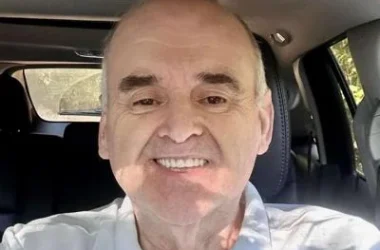By MEGAN ARCHER
The Herald-Dispatch
HUNTINGTON, W.Va. — He looks up from his iPad and gives a warm smile. Philip Carter, a social work professor at Marshall University, has asked to meet at Rocco’s Little Italy where he often goes for a quick meal. Standing at 6 feet 6 inches tall with an impressive amount of thick white hair, Carter and his big, booming voice are easily noticed.

(Herald-Dispatch photo by Lori Wolfe)
“Oftentimes people tell me they are scared of me. I’m this big, black, scary, loud guy, right?” Carter joked when asked how his students may perceive him. “But let me just say … the urgency of the situation is matched by the decibels of my voice. People have to hear you.”
Truer words have never been spoken, considering Carter has been making his voice heard since the early 1960s as one of the area’s prominent leaders of the Civil Rights Movement. Born in February 1941 in Widen, West Virginia, in Clay County and raised in Clarksburg, West Virginia, he considers himself a self-proclaimed “persist-er,” and believes the key to any positive change is persistence.
“I feel that in a way there are three assets I handle. The first is the courage to bring change. The second is the insight to share that vision with others, and the last one is the persistence to make it happen,” Carter said. “One day I hope to retire, but right now, there are things that still need to be done. There are things that still need to be changed.”
Carter has been advocating for social change since he came to Huntington in 1959 to play for the Marshall men’s basketball team. As a sophomore, Carter was the second African American basketball player to ever be chosen for the starting team – Hal Greer was the first. According to 1963 Mid-American Conference standings, Carter was considered to be amongst the top 12 leading scorers and had the fourth highest percentage of field goal and rebounds in the 1962-63 collegiate men’s basketball season.
But, needless to say, basketball was not his only focus.
Carter went on to graduate from Marshall with a Bachelor of Science in Political Science in 1965, furthering his education with a Master of Social Work from the University of Pittsburgh in 1970.
“Through my activism and participation in demonstrations at that time, I met Ken Hechler and Bobby Nelson, who became two of my biggest mentors. Ken later gave me a United States Congressional appointment, and it was the first and last time a student athlete from Marshall was given this opportunity,” Carter said.
Hechler, a longtime supporter of pro-civil rights legislation, died earlier this year at the age of 102. Unfortunately, this is not the only mentor of Carter’s who has died recently. His biggest inspiration – his mother – passed away at the age of 99 a few months ago.
“My mother was a philanthropist, and she was a very spiritual woman. People ask me why I don’t go to church more often. I say I’ve been to church my whole life. My mother was the church; my house was the church,” Carter said. “She always told me, ‘You will never be the scholar you need be unless you know the Bible as well as I do’. She knew the Bible, and she was a true believer.”
Carter said the most important thing his mother taught him is a very hard thing for many to learn.
“One of the things she instilled in me is the sense to give. I think those people who know me well know when it comes to my philanthropic activism, I give my time, my energy and my money. And if necessary, I would give my life,” Carter said.
In a way, Carter said he decided to give his life and dedicate himself to what he’s passionate about – teaching others how to give back. Now in his 38th year at Marshall, he has had the opportunity to create the Tri-State Organizing Committee, which allows social work students to interact with local policymakers that can affect change.
“Our social work students have the chance to meet local political candidates and address them with ideas and concerns they may have,” Carter said. “Social work is a profession that works to improve and strengthen individuals, families, groups, organizations and communities in their ability to connect with the institutions of society to satisfy all citizens and their needs at every level. Social workers are needed now more than ever.”
With programs like these in place and under the leadership of Marshall University President Jerome Gilbert, Carter said he believes the university is headed in the right direction.
“Universities and institutions of higher education must protect this sense of enlightenment, fairness, justice and, of course, love and equality. We all have to fight against those who show a lack of mercy or humanness,” Carter said. “I truly believe we have somebody (Gilbert) at Marshall who can do that, but he can’t do it alone. There has to be courageous faculty, staff and students who can help protect this pursuit of knowledge.”
Carter shows no signs of slowing down his pursuit. In an effort to stay current with what is happening in America, Carter said he intends to teach a course called “Black Athletes: Justice Matters” next spring. He currently teaches courses on social welfare legislation in Appalachia, introductory social work and his personal favorite, a 400-level special topics course titled “Black Lives Matter.” With the help of friends, who he refers to as the “social equity warriors,” Carter said his teaching routine and remembering his purpose are what keeps him active.
“What keeps me going? When you know what you have to do each day and you do it with passion, and you do it with purpose,” Carter said. “It’s folks like Bruce Moody and his wife Sandy, the Gray family, Gus Gleckley, Herbert Henderson, James Gipson, Marshall Grayson, Cicero Fain, Pat Austin, Danny Stewart, Richard Diehl, Tom Stafford, Dr. Simon Perry, Dr. Bill and Clara Cook – the list goes on and on. These are a few of the people that have served as social equity warriors in this community and who inspire me to keep going. We don’t recognize them enough.”
After four decades of persistence, Carter said he can still appreciate life, even though it has been dark at times. He said without the love of his beautiful wife Beverly and three children, he said he would not be where he is today.
“Just when I think I will not be able to see light, there is a bright beacon of humanity that peeks out of the darkness. Then, there’s a spark over here and a spark over there, and later on those sparks are flashes of light. And it’s been my way out of the darkness.”
Because most of Carter’s family now resides in Pittsburgh, many may wonder what has kept him in Huntington all of these years.
“What keeps me here? When you look back throughout our nation’s history, you can answer that question with one word: Hope. Where there isn’t hope, then you make a way to find hope. If you have more hope than you need, then you loan them that hope you have. Persistence is much more valued than people give it credit for. It has a nasty connotation. But the denotation is you are still here. And unless I am here, I cannot help to make change.”
See more from The Herald-Dispatch



